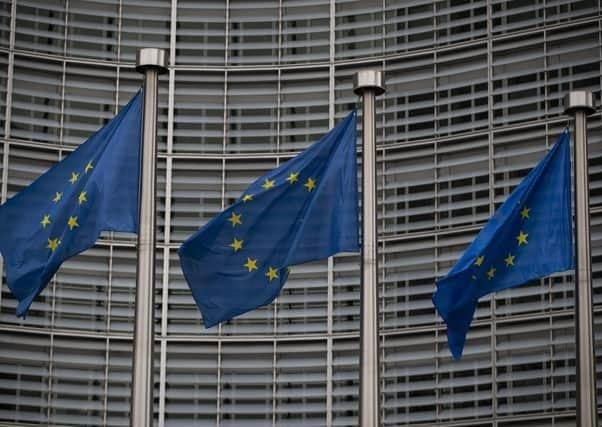Roderick Crawford: The reality is that UK law - not EU law - remains dominant in Northern Ireland


Things are not quite what they seem, however. EU law is not dominant in Northern Ireland. It largely applies to goods — their movement into Northern Ireland from Great Britain, but not from Northern Ireland to Great Britain, and their production in Northern Ireland.
EU law is related to the economy, not society (with the tiniest of exceptions). It applies to goods, but not services, and so applies to about 18% of Northern Ireland’s economy; the rest of the economy is services and construction.
Advertisement
Hide AdAdvertisement
Hide AdOf the 18% where EU law largely applies, 71% is manufacturing, yet for this sector EU law does not apply to labour, property, company law, accountancy standards, finance, currency, or tax (VAT limits apart).


In so far as EU law affects the production sector, it mostly applies to goods standards. However, the rules that govern the single market for goods, a market that was ‘completed’ on January 1, 1993, are long standing, well tested, and fully integrated into company processes across the UK.
The EU law that governs this sector is retained in UK law. In this sense, EU law is as dominant in the rest of the UK as it is in Northern Ireland for goods production.
EU standards are often based on global standards and sectoral standards. There will be some changes to these over time, but many will be carried across into UK rules applying in Great Britain and most serious companies will apply them anyway as they need to export to the single market or because the changes are based on updated information on health and safety — carcinogenic substances, for example.
Advertisement
Hide AdAdvertisement
Hide AdThere is also the option for a minority of MLAs to object to amendments to EU law and veto the application of new EU laws that create regulatory barriers within the UK. There is a veto vote on the whole body of EU law next year, and an independent review if it is continued. Mechanisms for managing regulatory divergence are in place.
There is much theoretical danger of divergence. Both the UK and the EU are sovereign, after all. They could do anything - in theory. In practice, of course, they won’t.
The UK has made a considered decision not to actively diverge from EU standards in goods and has retained the EU’s certification markings for goods under intense pressure from industry. This means not only is divergence not going to take place by way of UK decisions, but the politics and the policy barriers to alignment, where it makes sense, have largely gone.
In practice, the UK is subcontracting its goods standards to the EU, using the marketplace as its instrument. Labour will take a more purposeful approach to alignment and will re-set the UK’s approach to goods regulation for the next decades and redefine our relationship with the EU and its single market. The problem of regulatory divergence is receding, not growing; the likelihood of regulatory convergence is now in the ascendant.
Advertisement
Hide AdAdvertisement
Hide AdThe idea that Northern Ireland is going to be in a no-man’s land as regards regulation is nonsense. If EU law is not updated, Northern Ireland will remain aligned to retained EU law in Great Britain. If it does update, it will align with common practice in industry across the UK and the single market. Even agriculture will in practice see little divergence, with Labour pledged to sign an SPS and veterinary agreement with the EU.
Those who demand that there can be no application of EU law in Northern Ireland first forget that there is EU law in Great Britain as a consequence of the application of the Withdrawal Agreement and retained EU law as well. So their ‘principle’ is not quite what it seems. Worse, it is now an entirely undeliverable outcome from any negotiation. This is because access to the single market for goods requires application of EU law governing goods.
Alternative arrangements like mutual recognition failed to get traction in UK-EU negotiations in 2019 and remain total non-runners now. There is no possibility for Northern Irish companies to decide for themselves which regime to follow - that would turn every factory gate into a customs post.
It is one thing to highlight problems, another to present realistic solutions. Alignment with limited EU law is required to avoid a hard border on the island of Ireland and protect the single market; this was agreed in December 2017 and is non-negotiable. Any politician who tells you that it can be renegotiated is fooling themselves and misleading you.
Advertisement
Hide AdAdvertisement
Hide AdThere are irritants in the Windsor Framework most of us feel disappointed at some level, but there is room and willingness to address these, both in the current negotiations between the DUP and the government as well as in future UK-EU negotiations, perhaps based on the independent review’s findings.
Reality is that UK law remains dominant in Northern Ireland, including for the economy; the all-island economy does not exist outside of agriculture, and is not growing appreciably. Services are the dominant part of Northern Ireland’s economy and its most dynamic sector. That sector remains firmly governed by UK law, as does most of the production sector, and the entire economy remains highly integrated in the UK economy.
Roderick Crawford is a Policy Exchange Senior Research Fellow. He is author of ‘The Northern Ireland Protocol: the Origins of the Current Crisis’ (Policy Exchange, 2021) ), and ‘The Northern Ireland Protocol: The Clash of Two Treaties’ (Policy Exchange, 2023).